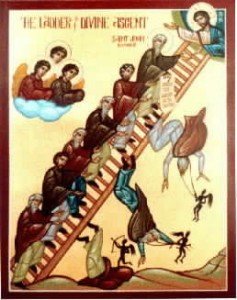 The fourteenth step on John’s Ladder, Gluttony, is particularly apropos for people during the Great Fast. Why? Because many times people spend fasting periods groaning about food. And not only this – some become so obsessive about observing the rules of the fact that they spend a great deal of time examining ingredients when they go shopping and are constantly thinking about what they can and cannot eat. The result is that they end up being more concerned with food during the fasts than they are the rest of the time, which contradicts one of the purposes of fasting: to attach less significance to food, not more.
The fourteenth step on John’s Ladder, Gluttony, is particularly apropos for people during the Great Fast. Why? Because many times people spend fasting periods groaning about food. And not only this – some become so obsessive about observing the rules of the fact that they spend a great deal of time examining ingredients when they go shopping and are constantly thinking about what they can and cannot eat. The result is that they end up being more concerned with food during the fasts than they are the rest of the time, which contradicts one of the purposes of fasting: to attach less significance to food, not more.
Also, fasters can sometimes find themselves concentrating more on what they will eat once the fast is over than on the meaning of the feast for which the fast prepares them. When the feast arrives, be it Pascha, the Nativity or another feast that has a fast preparing them for it, they consider gluttony to be perfectly acceptable. They stuff our faces with all the things they have spent many weeks fasting from.
This mentality can be recognized not only in the lengthier periods of fasting, but even on a weekly basis.
The fact of the matter is that fasting is meant to help us discipline ourselves so that we can focus on our spiritual development. It is not an end unto itself. It, by itself, does not bring about spiritual growth. Spiritual growth comes when we discipline ourselves to concentrate on our spiritual lives.
A gluttonous spirit craves food. It regards fasting as deprivation and therefore sees all other times as opportunities to make up for that deprivation. We must remember that fasting is not the fine we pay for not living up to the Way of Jesus.
